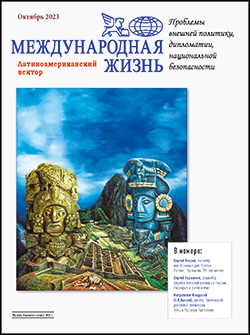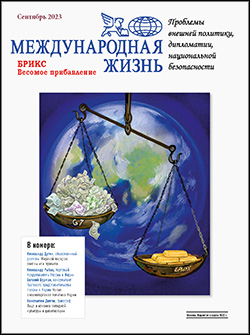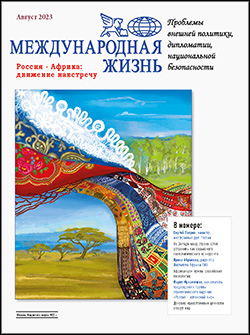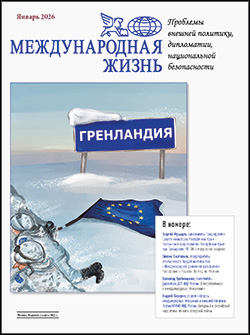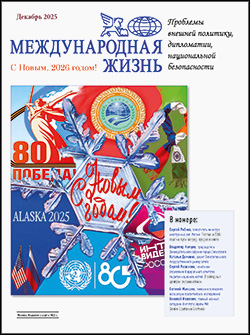Andrey Krutskikh
Global Cyberpowest: a diplomatic victory
Today, information and communication technologies (ICT) have the same decisive impact on national and global development, as well as determine the status of states in the international arena, the degree of their sovereignty, as nuclear technologies in the 40s of the last century or rocket and space technologies in the 1950s and 1970s.
Keywords: ICT, IIB, RSE, GPE
Yuri Yasnosokirsky
On the question of the applicability of international law in the information sphere
Currently, a separate sub-branch of international security law is being formed - the law of international information security. Speaking about the applicability of international law, from a legal point of view, it would be more correct to use the term "application/implementation of the norms of international law". In this sense, this concept implies the purposeful activity of a subject of international law, primarily a State and an international intergovernmental organization, to ensure the implementation of the norms of international law.
Keywords: IIB, ICT, international law
Ernest Chernukhin
About Russia's approaches to ensuring digital sovereignty on the example of international organizations
The search for a universal solution to countering global cybercrime in these conditions is possible only through negotiations in the UN format. That is why Russia, together with like-minded people, stands for the development of universal norms that would be shared by all interested parties and that would lay the foundations for effective and transparent international cooperation to combat this threat.
Keywords: IIB, digital sovereignty, ICT, UN Convention on Cybercrime, OSCE, ARF
Inna Svyatenko
The priority task of the state is to help citizens to raise their incomes independently
The entire international agenda is active, the Federation Council is trying to carefully preserve our contacts and relations that have developed with foreign countries. Members of the Chamber of Young Legislators at the Federation Council discuss with colleagues from other countries projects aimed at preserving the memory of the Great Patriotic War. In particular, a unique historical project of two countries - Russia and Belarus - created to search for monuments of the Great Patriotic War, "Digital Star", is being successfully implemented. To date, more than 2 thousand monuments have been digitized, and every day there are more of them.
Keywords: Russia, social policy, demography, national tourism, volunteering, accessible environment
Vladimir Batyuk
The Strategic Triangle and Europe
The "strategic triangle" of America - China-Russia became a geopolitical reality during the Cold War, when the world was split into military-political blocs led by two "superpowers" - the United States and the USSR. Official Washington sought to form it in such a way that the United States would occupy particularly advantageous positions in it, maintaining the most optimal relations with each of the communist giants than those with each other.
Keywords: "Strategic triangle", deterioration of US-China and Russia-EU relations, common spaces, European integration, investment agreement, tariff war, military spending
Kamaludin Hajiyev
On the ideologization of the US foreign policy strategy
US President A. Lincoln argued: "America cannot be destroyed by external forces. It can be destroyed only if we make mistakes and lose our freedom." It seems that in recent years, Americans, regardless of whether they want it or not, have begun to make fatal mistakes that have an ever-increasing impact on the geopolitical situation of both the United States and the entire modern world.
Keywords: USA, China, Russia, geopolitics, world order, challenges, answers, strategy, ideology, values, national interests, mistakes
Alexander Zmeevsky
Russian-Czech relations are currently experiencing a deep crisis
The current deplorable state of Russian-Czech relations was the result of consistent unfriendly actions taken by the Czech side for a number of years. It is regrettable, but a fact: the foundations of bilateral cooperation, painstakingly built up by joint efforts for decades, have been seriously undermined. Having committed an unprecedented unfriendly act against Russia, our partners make it clear that they do not intend to stop there.
Keywords: World War II, archives, historical documents, Russian-Czech relations
Marina Kravchenko
"Go to Moscow, see Stalin"
July 30, 2021 marks the 80th anniversary of the first visit of Harry Hopkins, the personal representative of US President Franklin Roosevelt, to the Soviet Union. A great occasion to recall some of the most significant moments from the political biography of this amazing man. Hopkins is one of the few to whom fate has given the opportunity to create history with his own hands.
Keywords: G.Hopkins, F.Roosevelt, World War II, Lend-lease, the Second Front, the "Big Three"
Andrey Manoilo, Vladislav Telichko, Alla Popadyuk
Methods of countering fake news
The high penetrating power of fake news, the unique ability to reach large audiences almost instantly, master people's minds and control them forced fake news to be classified as an "absolute weapon": in 2016, fake attacks caused only panic, no one knew how to resist them, there were no verified tools to counteract fakes.
Keywords: politics, fakes, stuffing, information operations, "counter wave", security
Oleg Karpovich, Tatiana Zvereva
The EU's Common Migration Policy: a new start?
The development of the EU's common migration policy and the approval of the new Migration and Asylum Pact proposed by the European Commission on September 23, 2020 is one of the most important tasks of the EC for 2021. At the same time, even if the pact is adopted, it is unlikely to lead to a breakthrough in resolving migration problems in the European Union.
Keywords: European Union, common migration policy, European Commission, migration crisis, Migration and Asylum Pact, Dublin system, quotas for refugee accommodation
Oleg Vishlev
German Embassy in Moscow: March-June 1941
After Hitler signed a directive on December 18, 1940 on the preparation of an attack on the USSR, the Supreme Command of the Wehrmacht began developing measures to disguise Germany's military preparations at the Soviet border. The disinformation operation was carried out by the German military authorities, the Foreign Ministry and the Ministry of Propaganda of the Third Reich, as well as the German special services in conditions of strict secrecy. But what was the role of the German embassy in the USSR in this operation - the country against which aggression was being prepared?
Keywords: disinformation operation, OKV, OKH, Schellenberg, Koestring, Krebs, Hilger, Dekanozov
Читайте другие материалы журнала «Международная жизнь» на нашем канале Яндекс.Дзен.
Подписывайтесь на наш Telegram – канал: https://t.me/interaffairs

 12:13 21.07.2021 •
12:13 21.07.2021 • 